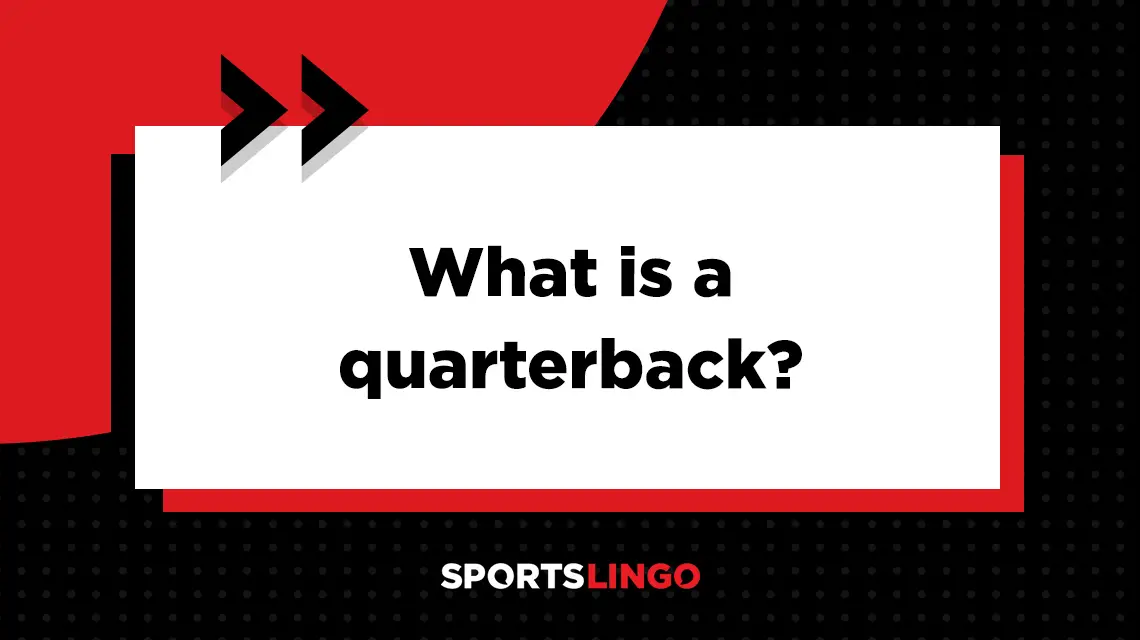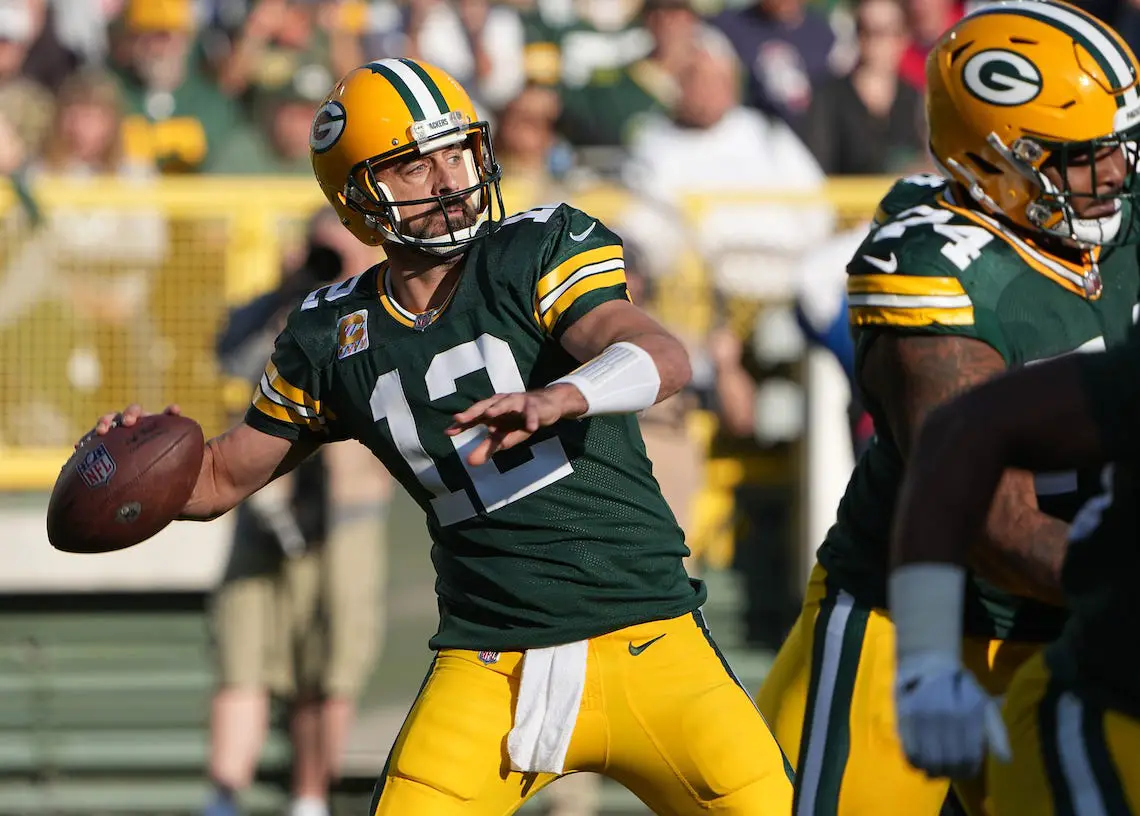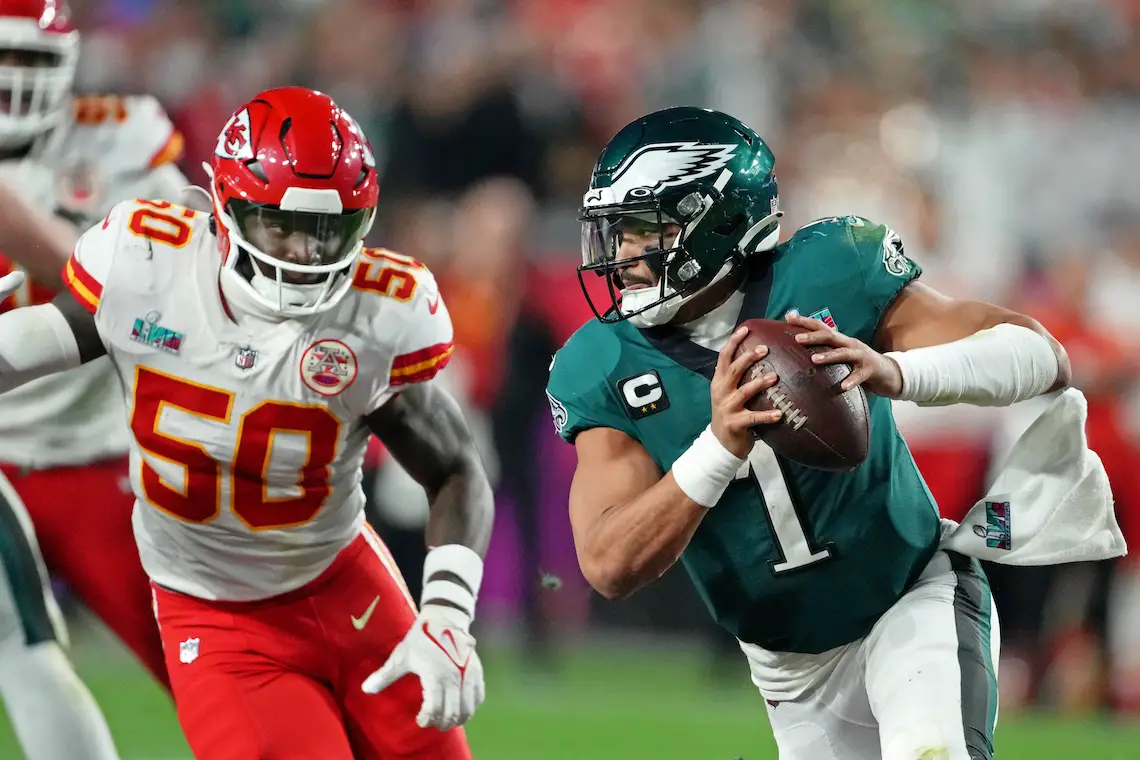
quar*ter*back
What is the definition of quarterback in football?
1. The quarterback is an offensive position player in football who lines up behind the center and directs the team’s offensive plays. The quarterback, who relays the offensive play in the huddle to the rest of the offensive team, is usually considered the main leader of the football team.
After the center snaps the ball, the quarterback will try to either hand the ball off to the running back or drop back to throw the ball for a forward pass.
What does a quarterback do?
The quarterback is the leader of a team’s offense. On the field, they call the offensive play in the huddle before each down. Then, they line up near the center of the backfield near the fullback and running back. If the quarterback sees a potential issue with the play based on how the defense lines up, they may choose to call an audible to change the play.
The center snaps the ball to the quarterback to begin the play. Then, the quarterback does one of the following with the goal of securing a first down or a touchdown:
- Forward pass: The quarterback usually tries to pass the ball in order to gain more yards on the field. The team’s receivers make runs on planned routes, and the quarterback passes the ball to meet the receiver in stride.
- Handoff: On rushing plays, the quarterback will make a handoff to the running back so they can move the ball forward. The handoff can be made directly or with a short lateral pass.
- Rush: The quarterback may rush the ball in an attempt to gain yards, sometimes as part of a trick play.
- Sneak: A quarterback sneak occurs when the play calls for the quarterback to hold the ball after the snap and attempt gain a few yards, usually by diving forward over the offensive line.
- Scramble: If the play does not go as planned, the quarterback may make an impromptu decision to hold on to the ball and try to evade the defense. This is referred to as a quarterback scramble.
Ideally, the way the quarterback proceeds after the snap will follow the offensive play they called in the huddle. However, quarterbacks often have to make split-second decisions in the moment based on how the opposing team’s defense advances.
For example, if the receiver they originally intended to pass to is covered too closely and unable to find open space on the field, the quarterback may opt to run with the ball instead of attempting a pass in order to minimize the chance of an interception.
As the team’s main passer, the quarterback is primarily responsible for the success or failure of a team’s offense. It is important for quarterbacks to prevent turnovers to the other team by avoiding tackles and sacks. The pocket which is formed around the quarterback is critical to preventing these outcomes.
What skills does a quarterback need?
Quarterbacks must possess a number of skills, including passing precision, decision making, field vision and leadership.
Passing precision
Quarterbacks must be great passers. They need excellent accuracy with their passes in order to successfully reach the receivers. In addition, they must have good arm strength for making longer passes.
Decision making
Quick decision-making skills are necessary for the quarterback position. Before each play, they must call upon their knowledge of the team’s playbook and determine the best course of action. These players must also be able to think on their feet when plays do not go as planned and make split-second decisions that directly affect the success of their team’s offense.
Field vision
Quarterbacks must be able to quickly interpret the movement on the field to make smart passing decisions. In addition, they must have a deep understanding of different play styles and defensive formations so they can assess the strengths and weaknesses of the opposing team.
Leadership
The quarterback directs the offense on the field, and they are often looked to as a leader for the entire team. They are regularly selected as team captains and help to motivate the team.

Mark Hoffman/USA TODAY Sports
What are some important qualities of a quarterback?
A good quarterback has the following qualities:
- Composure: They stay calm under pressure and make smart decisions in intense situations.
- Intelligence: Quarterbacks must master the playbook and understand the game on a deep level. Many study game films between games and during the offseason.
- Athleticism: This position requires less brute strength and conditioning than others, but quarterbacks must still be agile and strong.
What is a dual-threat quarterback?
A dual-threat quarterback is skilled at both passing and rushing the ball. Their ability to excel in both of these areas make them especially valuable to their team. They are often contrasted with pocket passer quarterbacks, who are primarily skilled in passing from the pocket, and system quarterbacks, who are generally only successful with a specific type of offensive strategy.
What is the difference between a quarterback and a football player?
A quarterback is a player on a football team. All quarterbacks are football players, but not all football players are quarterbacks. Football players can occupy many other positions on the field, such as defensive lineman, tight end, or wide receiver.
What football statistics measure quarterback performance?
Some of the statistics used to evaluate quarterbacks include:
- Quarterback rating (QBR)
- Total passing yards
- Passer rating
- Touchdown-to-interception ratio
- Touchdown percentage
- Completion percentage
- Yards per attempt
- Winning percentage
- Expected points added (EPA)
Why is it called a quarterback?
The name “quarterback” comes from the way football players used to line up before a play began. The fullback was furthest back from the line of scrimmage, and the halfback was positioned halfway between. The quarterback was halfway between the halfback and the line of scrimmage, so they were only a “quarter” of the way back in comparison to the others.
Though offensive formations have been slightly modified since the early days of football when the term came about, the name “quarterback” stuck.
What’s another word for quarterback?
Field general is another term used to describe the player in the quarterback position. This name derives from the quarterback’s responsibilities on offense. The comparison between a quarterback and a general is apt because they both have important leadership roles. Quarterbacks direct the offensive players by calling different plays and make decisions about where to throw or carry the ball.
In addition, quarterbacks are sometimes referred to as signal callers because they are responsible for selecting offensive plays and relaying that information to their teammates.
What is the abbreviation for quarterback?
In American football, quarterback is abbreviated as QB.
What is the opposite of quarterback?
The middle linebacker is the opposite of the quarterback on the field. While the quarterback is the leader of the offense, the middle linebacker is usually the leader of the defense. Each of these positions call out plays for their respective teams while they are on the field, and both line up in a central location on the field when a play begins.

Kirby Lee/USA TODAY Sports
How many quarterbacks are in the NFL?
The National Football League (NFL) has at least 64 quarterbacks. There are 32 teams in the NFL, and each team has a starting quarterback and a backup QB on the roster.
Most teams stick with two quarterbacks. However, NFL teams are permitted to have up to three quarterbacks in uniform on game days during the regular season and the playoffs. This means that the number of NFL quarterbacks can theoretically be as high as 96.
Who was the best quarterback?
Tom Brady is widely considered to be the best quarterback of all time. Brady was the quarterback for the New England Patriots for 20 seasons, followed by three seasons with the Tampa Bay Buccaneers. He has the most Super Bowl appearances and wins of any player in NFL history. In his 23 seasons of pro football, Brady played in 10 Super Bowls, won seven of them and was honored as the Super Bowl MVP five times. He also played in 13 AFC Championship Games and holds almost every quarterback record, including the most career passing yards (89,214).
Interestingly, Brady was the 199th overall pick at the 2000 NFL Draft. He was also selected for the 1995 MLB Draft after excelling in baseball in high school, but chose to pursue football instead.
Prior to Tom Brady’s NFL career, Joe Montana was considered the best quarterback in NFL history. He played with the San Francisco 49ers for 14 seasons and spent his final two seasons playing for the Kansas City Chiefs. Montana had exceptional pass accuracy and was a four-time Super Bowl winner.
Some of the other top quarterbacks from NFL history include:
- Peyton Manning: Indianapolis Colts, Denver Broncos
- Johnny Unitas: Baltimore Colts, San Diego Chargers
- John Elway: Denver Broncos
- Drew Brees: San Diego Chargers, New Orleans Saints
- Dan Marino: Miami Dolphins
- Roger Staubach: Dallas Cowboys
- Aaron Rodgers: Green Bay Packers
- Brett Favre: Atlanta Falcons, Green Bay Packers, New York Jets, Minnesota Vikings
- Troy Aikman: Dallas Cowboys
- Steve Young: Tampa Bay Buccaneers, San Francisco 49ers
- Terry Bradshaw: Pittsburgh Steelers
- Russell Wilson: Seattle Seahawks
- Ben Roethlisberger: Pittsburgh Steelers
- Kurt Warner: St. Louis Rams, New York Giants, Arizona Cardinals
- Norm Van Brocklin: Los Angeles Rams, Philadelphia Eagles
As of 2022, some of the top-ranking quarterbacks currently playing in the NFL include:
- Patrick Mahomes
- Jalen Hurts
- Josh Allen
- Joe Burrow
- Aaron Rodgers
- Justin Herbert
- Lamar Jackson
- Kyler Murray
Examples of how quarterback is used in commentary
1. Russell Wilson is considered one of the best young quarterbacks in the league. Not only does he perform at a high level on the field, but he’s also a strong leader in and out of the locker room.
2. The Ravens quarterback lines up in the shotgun, snaps the ball and throws a quick slant to the receiver to outsmart the Lions defense for a 5-yard completion.
Sport the term is used
1. Football
Abbreviated as:
1. QB
Also known as:
1. Field general
2. Signal caller